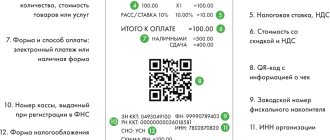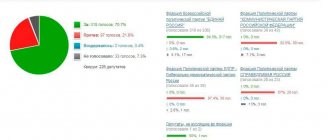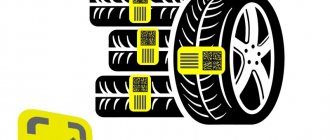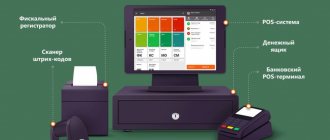Author of the article
Natalia Zorina
Bank employee. Knowledge of financial topics. Higher education.
Articles written
73
The transition of taxpayers to online cash registers has been going on for several years, and every year it affects more and more representatives of micro and small businesses. In accordance with Federal Law 290 on the use of cash registers, new changes to the rules for the use of fiscal devices came into force on July 1, 2019. Let's talk about them in more detail.
Application of cash register equipment according to 290-FZ
Federal Law No. 290 was adopted on July 3, 2021. According to this regulatory document, only models of cash register equipment that meet the following requirements could be registered with the Federal Tax Service:
- availability of fiscal storage;
- the ability to transmit information to the tax office via the Internet;
- service from a fiscal data operator (FDO), through which information is transmitted to the Federal Tax Service.
Legislators took into account that not all entrepreneurs have the technical ability to install a new cash register. In addition, for many micro-business representatives, the introduction of online cash registers (even those not equipped with acquiring modules) meant significant costs, which would ultimately affect the cost of the goods or services they provide.
To mitigate the situation, Federal Law No. 290 granted the right to certain categories of businessmen to work without fiscal equipment, provided that they could, at the request of the client, provide him with a “sales receipt” according to a certain sample. However, the list of “beneficiaries” changed regularly, and continues to do so. The latest amendments to the law on online cash registers came into force on July 1, 2019. Let's see who they affected this time.
Electronic checks
Electronic checks are another innovation introduced by Federal Law No. 54, non-compliance with which can lead to a significant fine, namely, we are talking about refusal to transfer a check to the buyer in electronic form (in addition to paper) via SMS or e-mail, if he has requested it.
The law gives electronic checks and BSOs the same legal force as paper ones.
This innovation is associated with the growth of online sales and the desire of customers to make any purchases and pay online. Not every operator provides the service of sending electronic checks, therefore, when choosing an OFD, you should pay attention to this, and this item, if present, is separate from the main tariff.
Buyers using electronic checks were able to independently verify their authenticity through a special mobile application developed for the Android and iOS platforms. All information about unsent checks is displayed by the cash register itself to the cashier.
Online stores and vending businesses choose online cash registers
Such types of new business as online commerce and vending machines are designated in Federal Law No. 54 as mandatory for the transfer of fiscal data to the Federal Tax Service. Electronic receipts must be sent to customers immediately after making a purchase or paying for a service. The process is fully automated through special software, the so-called “Internet cash register”. In March 2021, it put into operation “online cash registers”, through which electronic receipts are generated and transmitted to customers, and data from the FN is sent to the OFD. The idea is simple and convenient for entrepreneurs, who are relieved of the worries of maintaining equipment, which the ATOL virtual cash desk takes on. But the company does not provide these services for free. The service requires a monthly subscription fee and the purchase of a new fiscal drive every 13 months. In addition, the entrepreneur cannot control the mediation of this service.
If everything is more or less clear with online business, then with vending machines the situation is different. This business is very popular and is actively developing throughout the country, which cannot but be noticed at the top. At the moment, it is planned to develop a cash register for vending machines, which would be connected to a printing device inside the machine.
How to replace the fiscal drive (FN)?
The law establishes the validity period for fiscal storage keys:
- 13 months – for businesses with a general taxation system;
- 36 months – for small businesses (UTII, patent, simplified tax system).
Sellers of excisable goods are also required to purchase a fiscal storage device valid for 13 months.
In order to replace the fiscal drive in most cash register models, you don’t even need a screwdriver. The owner of the cash register or an authorized representative will be able to do this independently. The process takes no more than a few seconds, a maximum of a minute:
- Open the cover on the cash register body;
- Remove the old fiscal drive;
- Install a new fiscal drive;
- Close the lid.
This algorithm for changing the FN is suitable for most models of cash registers, however, there are also devices in which to replace the drive you will have to spend money on technical service. Therefore, it is worth paying attention to this fact when choosing the best online cash register option for your business.
Before replacing the fiscal drive, close the archive on it. You need to close the archive only at the moment of expiration of the FN. In any other case, even out of curiosity, this should not be done!
We also remember that having replaced the FN, it is necessary to go through the procedure of re-registration of the cash register, indicating the reason “Re-registration due to a change of FN”.
Who should use CCP from July 1, 2021
In connection with new amendments to the federal law, the procedure for settlement and cash services will change for the following categories of entrepreneurs:
- Individual entrepreneurs and LLCs on imputed, simplified and OSN;
- individual entrepreneurs on PSN, whose activities are related to the provision of services and have employees;
- legal entities on PSN and UTII selling goods from third-party manufacturers. Not attracting hired workers;
- legal entities operating under UTII that do not employ employees;
- Individual entrepreneurs working under UTII or OPS in the catering sector, who do not employ hired employees;
- owners of vending machines with zero staff;
- carriers selling travel tickets in the transport cabin.
All of the listed categories of businessmen will have to acquire a new type of cash register. The procedure and timing for installing equipment can be clarified in Article 7 of the federal law.
Other amendments to 54-FZ
Legislators also made other amendments to Law 54:
- It is mandatory to issue a cash receipt when repaying a loan issued for the purchase of goods.
- When paying out winnings, gambling organizers are required to issue a receipt marked “expense”.
- It is allowed to generate one check per day, week or month for all cases of refund to clients of overpayments for services or carrying out mutual offsets.
- The deregistration of a cash register is carried out automatically upon liquidation of a business entity based on an extract from the state register.
- To correct errors in a check, you must use a correction check. Previously, it was recommended to issue a refund of the receipt and issue a new check.
- The period for issuing a cash register registration card has been increased to 10 days.
- All cash receipts must display a QR code from 07/03/2018.
Read why you need a QR code here.
Who is exempt from CCT until 07/01/2021
For a number of taxpayers, federal legislation makes it possible to delay the transition to the new cash settlement system. These include individual entrepreneurs who meet the following criteria:
- do not have employees;
- sell goods of their own production;
- sell works or services.
At the same time, entities selling goods of their own production. Must work under UTII or OPS. Entrepreneurs who provide services to the population or perform work on a paid basis can work under any of the existing taxation systems.
Who is a fiscal data operator and why is he needed?
Legislatively, in the process of transferring data from the cash desk to the Federal Tax Service, a mandatory intermediary is provided - the fiscal data operator, or OFD. These are companies to which the Federal Tax Service has delegated to collect information from fiscal cash registers and broadcast it to their servers. The OFD register is published on the Federal Tax Service website. An agreement with the OFD must be concluded for each cash register. The cost of an annual contract is 3,000 rubles.
An important question is how quickly your check will be sent to the Federal Tax Service. There is no requirement in the law to immediately send a check to the OFD. Up to 30 calendar days are allotted for this from the date the check is generated. Therefore, if the Internet “fell off”, nothing bad will happen, unsent checks will accumulate in the fiscal drive, and when the connection is restored, they will be sent to the OFD. But if the information is not transmitted within 30 days, the fiscal drive will be automatically blocked and the cash register will stop printing receipts.
Despite the presence of an intermediary, the owner of the cash register is responsible for the timely transfer of data to the Federal Tax Service.
Who is exempt from CCT indefinitely?
The text of 290-FZ also contains a list of entities for which the installation of a new type of cash register is not required at all. These include:
- credit organizations;
- Individual entrepreneurs working under the patent taxation system (with rare exceptions);
- entrepreneurs operating under the “Professional Income Tax” regime;
- LLCs and individual entrepreneurs whose payments are made in remote or hard-to-reach areas;
- pharmacies for AF and FAP in rural areas;
- persons providing services for ritual rites and ceremonies, sellers of religious literature and religious objects;
- Homeowners' associations, educational and physical culture and sports organizations, cultural centers, etc. (when charging for your services in cash);
- Individual entrepreneurs selling theater tickets and subscriptions.
Also, from July 1, 2021, the previous cash settlement procedure will be maintained for entrepreneurs selling at markets, fairs or for delivery, selling newspapers and magazines, drinking water/kvass/ice cream/milk/live fish/seasonal vegetables/shoe covers. In the service sector, shoemakers and haberdashers, porters and wood sawers, as well as persons caring for disabled people are exempt from installing online cash registers with acquiring. New cash registers and recycling collection points are not required and will not be required (with the exception of scrap metal and precious metals collection points).
Important ! There are exceptions for some of the listed categories. You can read them in the text of Federal Law No. 290.
Who has the right not to use online machines: latest changes to 54-FZ
To find out if you can do without using online cash register, please refer to the current version of Art. 2 of Law No. 54-FZ. It exempts from the use of cash register systems when carrying out certain types of activities, including (Article 2 of Law No. 54-FZ):
- sale of magazines and newspapers, regardless of the place of sale;
- sale of securities;
- trade in retail markets, fairs, exhibition complexes (with some exceptions), as well as during peddling trade by hand or hand carts outside of a stationary trading network, as well as in passenger train carriages or on board aircraft;
- sale of ice cream in kiosks, as well as soft drinks, water or milk on tap;
- trade from tank trucks in kvass, milk, vegetable oil, live fish, kerosene, seasonal trade in vegetables, including potatoes, fruits and melons;
- shoe repair and painting;
- leasing (hiring) of residential premises owned by an individual entrepreneur, etc.
Also, CCP may not be used:
- sellers working in remote and hard-to-reach areas;
- NAP payers;
- banks and other credit organizations;
- insurance agents when selling policies.
In addition, it is allowed not to issue a receipt when selling goods (except for technically complex ones) through vending machines. Moreover, from 02/01/2020, the vending machine must be equipped with a display on which a QR code will be displayed.
For more information, see: “Who is exempt and may not use online cash registers?”
Responsibility for violation of law No. 290-FZ
Responsibility for non-compliance with settlement and cash service standards is regulated by the Code of the Russian Federation on Administrative Offenses, as well as Federal Law No. 195, the latest edition of which was published in May 2021. According to these regulatory documents, responsibility for violations is imposed both on the employee who accepts payment and works with fiscal equipment, and on the owner of the organization.
- For a broken check, the seller is subject to a fine of ½ to ¼ of the purchase price, but not less than 10,000 rubles. For legal entities, the fine will range from 3/4 to 100% of the purchase volume, but not less than 30 thousand rubles.
- For work on a cash register that does not comply with the requirements of current legislation, the official will be charged a fine in the amount of 1.5 to 3 thousand rubles. Legal entities will have to pay from 5 to 10 thousand rubles for the same violation.
- Failure by an entrepreneur to provide cash reporting to the Federal Tax Service, or provision of it in violation of deadlines, is punishable by a fine of 2 thousand rubles. for an official, and 10 thousand rubles. for a legal entity.
Important ! For entrepreneurs working in the field of housing and communal services and public transport, penalties have been abolished by the current version of Law No. 290. They have the opportunity to work without online cash registers, or with cash registers that do not comply with current standards, until July 1, 2021. However, no penalties will be applied to them.
Where to buy and how much does a new online cash register (KKT) cost in Yekaterinburg?
Buying a cash register online in Yekaterinburg will not be difficult if you have already decided on the manufacturer, model and approximate functionality of the device. The cost of the cash registers themselves depends on these criteria and varies within small ranges from different sellers.
The purchase of an online cash register is accompanied by the integral purchase of an online service of virtual (cloud) solutions, kindly provided by cash register manufacturers. But the cost of such “service packages” varies significantly. On average, the minimum monthly subscription fee starts from 500 rubles.
The cost of a cash register also depends on the presence of a fiscal drive in the kit. Unfortunately, the cost of these things is greatly inflated due to a banal shortage in the market due to the high demand for online cash registers.
In theory, online cash registers for the most part are modified old cash registers. It would seem that such equipment should not be expensive. However, it is the retrofitting of expensive elements that provide Internet connectivity, especially wireless communication modules (Wi-Fi), that increase the cost of online cash registers significantly. The average price for one device with an optimal set of functions is approximately 20 thousand rubles.
Most cash register manufacturers have taken a course towards optionally retrofitting cash registers with various modules. Therefore, some cash registers, especially mobile (portable) devices, may have a LAN network port, but they will not have a SIM card slot. In stationary devices it is exactly the opposite: there is a module for wireless communication, but there is no port for a wired network connection to the Internet, which supposedly did not fit under the case.
Ekaterinburg is a modern city and equipped with advanced technologies. And there seem to be no problems with wireless Internet. But, if your plans include purchasing portable cash registers, make sure that they have a slot for a SIM card. As a last resort, purchase an external modem or create an access point on your phone with a connected tariff to work only on the Internet. Thus, you will be able to transfer fiscal data from anywhere in the country and the world.
How to avoid blocking the fiscal drive (FN)?
Your cash register will be automatically blocked if:
- There is no fiscal drive in the special cash register slot;
- FN is faulty;
- The discrepancy between the time on the built-in timer of the cash register and the physical function is more than 5 minutes;
- There were attempts to generate fiscal documents in one shift lasting more than a day;
- The established period for the formation of a fiscal attribute for fiscal documents by the fiscal accumulator has expired;
- The cash register is faulty, resulting in damaged printed documents;
- The specified bit depth of the processed numbers has been exceeded;
- The sequence of a number of operations specified by the working algorithm of the cash register has been violated;
- Receipt tape is missing;
- Fiscal data generated by the cash register is not transmitted for more than 30 days. The blocking will be removed automatically when the cash register is connected to the Internet.
You can unlock the device by installing a non-activated fiscal drive or an activated one from this cash register.
What's the result?
Online cash registers, along with online registration, re-registration, etc. are designed to simplify the already difficult fate of Russian entrepreneurs. You accept any innovation with caution and distrust, because there is no understanding of how it works and what it is needed for. Once the whole process is debugged, everything will fall into place.
Those entrepreneurs who conduct honest business will unconditionally accept all amendments to Federal Law-54, as they see in them the obvious benefit of relations with the Federal Tax Service. You will always have something to present to the “unscrupulous” tax officials who show up for their next pseudo-check. Every step, every penny is recorded on a fiscal drive, the data from which is stored by the OFD. You can request them at any time and compare them with figures from the tax office.
In addition, you, as a business owner, can monitor and control all transactions performed by your employees through the cash register using your personal account on the OFD website. Soon you will forget about numerous cash books and journals, stop collecting receipts and manually generating cash reports. FN and OFD will do this work for you!
GOOD TO KNOW:
- The advice applies to entrepreneurs working under UTII and on patents, for whom fiscal accumulators are provided for a period of 36 months. There is no need to buy just such FNs without caution. Think you'll save money? Hardly. Think and count. The blocks are changed very easily, almost like removing/installing a battery in a mobile phone. In addition, if you work under two tax systems, for example, UTII and the simplified tax system, you are automatically deprived of the right to use the federal tax system for 36 months.
- Feel free to register your personal account on the Federal Tax Service website. Leave “beating the threshold” of the tax service in the past. Now you can avoid long waits in queues and avoid the arrogant looks of their employees. Online registration of cash registers, deregistration or replacement of EKLZ is simple, convenient and fast. If you have an electronic signature, registering or deregistering a cash register will take no more than two hours, most of which you will be doing with your current affairs.
- To avoid “astronomical” bills for connecting to the Internet, try to choose small providers who are just entering the market and are not impudent with tariffs. The quality of communication from such companies is an order of magnitude higher than that of large operators, and the prices and tariff line are many times more pleasant and acceptable for legal entities. Unfortunately, this whim is not available to entrepreneurs in small towns where a monopoly provider reigns. But we will wait until civilized competition reaches them.
- Some cash registers are equipped with the ability to transfer data via the mobile Internet via a SIM card. Fortunately, mobile Internet coverage is much greater than a wired network. Therefore, it is very convenient and cheaper to use such cash registers where there is no possibility to connect Wi-Fi. If the cash register, on the contrary, only has the ability to connect wirelessly to the Internet, then you just need to create an access point on a smartphone specially purchased for the cash register and use the Internet distribution. This feature is offered by almost all smartphone manufacturers. If you do not plan to use this Internet channel for anything more than transmitting fiscal data, which in itself is low-cost, then choose the cheapest tariff from a mobile operator.
- Fiscal data can be transmitted once every 20-30 days. After this period, if the data transfer does not take place, the FN will be blocked. Unlocking will occur automatically after connecting the cash register to the network. One check weighs approximately 1 KB. Simple mathematics: when transferring 1000 checks, you will need 1 MB of traffic, which is quite possible for a regular mobile Internet. But tax service specialists and cash register manufacturers do not recommend using such a scheme. It is better not to delay the transfer of data, but to do it in a timely manner.
Remote CCP
The amendments establish a list of situations in which a remote online cash register can be used. This:
- peddling and distance selling, for example, through couriers;
- payments for services through automatic devices (gas stations, car washes, automatic laundry);
- on-site services, such as window installation;
- services with the issuance of BSO;
- sale of tickets by conductors or drivers in public transport;
- services of management companies, homeowners associations and service provider organizations.
In these cases, the check can be transferred to the client in one of two ways:
- send by email or phone information to search for a check on the Federal Tax Service or OFD website;
- make it possible to read the QR code. When a person reads the code, he will be able to find the receipt in the Federal Tax Service application and, if necessary, print it. Such a check is equal to a check generated on a cash register or sent electronically.
But the amendments do not cancel the ability to use a regular online cash register at the point of payment.
Using a remote online cash register in transport
The amendments give conductors and public transport drivers the opportunity to use a remote cash desk and transfer receipts to passengers in several ways:
- issue a paper or electronic check generated at an online cash register;
- send by email or sms the details of the check and a link to the site where it can be downloaded;
- show a QR code so that the client can read and find the receipt in the application and, if necessary, print it;
- print the receipt details on the ticket.
Regarding the current situation with the old cash registers:
Theoretically, it is possible to modify most of the old cash registers, but since it will be necessary to supplement it with a FN (fiscal drive) and a modem - a network card, or even change the main board of the device, the price of the issue will be quite significant (according to subjective estimates, from 20-25 tr. )
, and it will most likely make sense if the fiscal recorder is in excellent technical condition. But this aspect has not yet been completely resolved in some respects...
The state register of cash registers for 2021 - online as of the current moment is published here..
Are there any advantages for business in the new law?
Despite the fact that, due to the new law that has come into force, small businesses will incur quite significant costs and will be forced to restructure their work in many respects, this reform has a number of advantages and disadvantages.
The main benefit from the new order will go to entrepreneurs, whose level of income depends not on the degree of cunning in relation to tax evasion, but on how useful the business they have created, how much customers value it, and how well-established business processes are. That is an honest business.
Those for whom concealing revenue was a means of increasing business efficiency will certainly suffer greatly. And the more expectations were placed on tax evasion, the more severe the blow will be dealt by the new legislation.
Other beneficial effects include the following:
There is no need to go to the Federal Tax Service for registration, re-registration, deregistration of cash registers - now all this can be done remotely on the Federal Tax Service website.
Reducing the number of checks (at least this is what is declared). Since sales data will be sent to the tax authorities automatically, fiscal officials will no longer need to conduct mass audits with employees directly visiting the locations where cash registers are installed. Checks of cash registers and payments will now be carried out automatically.
It is also declared that it will be possible to service cash registers independently - without the usual expensive contracts with Technical Service Centers (TSC). But in practice this has not yet been confirmed. Manufacturers of cash registers are trying to maintain the monopoly of their specialists on servicing equipment, threatening to remove warranties.
Law on the application of CCP
According to Federal Law No. 54 on the application of cash register systems, any type of business activity, including the provision of services, must record financial transactions exclusively through a new-style cash register. This applies to those who have been using such technology for a long time, and to groups that previously did not have to use devices when serving customers.
Why was the procedure for using CCP introduced? There are several reasons for this:
| Revenue tracking. Service through cash registers will allow you to bring unscrupulous business owners out of the shadows, creating healthy competition for all other entrepreneurs. In this way, not only do legal contributions to the budget increase, but pricing is also regulated. |
| Reduced inspections. Despite some negativity at the start of the project, the majority of trade participants noted the positive dynamics associated with the use of cash register systems. The number of inspection raids has decreased, since the tax office always has the necessary data at hand. |
| Process automation. With the help of modern cash register equipment and appropriate software, it was possible to establish automatic generation of reports, preparation of documents and a lot of other paper work that was previously performed manually. |
| Buyer protection. Now, having received an electronic copy of the receipt, you can find out details about the purchase, its origin and other information. Such a service was previously unavailable to the average consumer, so it was received very positively. |







